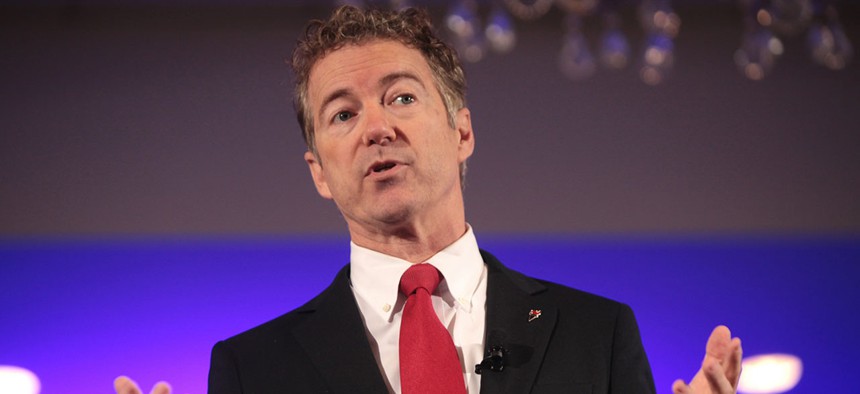
Flickr user Gage Skidmore
The Foreign Policy Thorn in Trump’s Side
Rand Paul could complicate the president-elect’s plans on defense and international issues.
Since arriving in the Senate six years ago, Rand Paul has been a consistent thorn in the side of Democrats and Republicans alike on foreign policy. And that’s not going to change, even once a member of his own party occupies the Oval Office.
As Donald Trump has rolled out his Cabinet picks over the past few weeks, few members of Congress have been as outspoken about them as Kentucky’s junior senator, who had been laying relatively low after his exit from the presidential race in February. On the domestic front, Paul has been quite supportive, praising Trump’s selections to head the Health and Human Services, Transportation, and Education departments.
On foreign affairs, though, Paul—who has long clashed with hawks in his own party—has been combative, especially as Trump has considered potential nominees for secretary of State in a very public fashion. Paul has raised the possibility of blocking John Bolton and Rudy Giuliani, sayingthey are “unrepentant in their support for the Iraq War.” He questionedhow Republicans could confirm David Petraeus, who was convicted of mishandling classified information, “with a straight face.” And he’s indicated that he still wants to hear more from Mitt Romney.
Given his perch on the Senate Foreign Relations Committee—with its 10-9 partisan roster—as well as the GOP’s slim majority in the upper chamber, Paul is in a position to cause some serious headaches for Trump not just during the Cabinet confirmation process, but throughout the early stages of his White House tenure as his foreign policy begins to take shape.
“Rand is not the kind of guy to be a stick in the mud on everything,” said one Republican strategist familiar with Paul’s thinking. “But where he will put his foot down will be on the issue of foreign policy, and that should not come as any surprise to anybody in the Trump orbit.”
Paul has been open to one of Trump’s reported secretary of State finalists: Bob Corker, the chairman of the Foreign Relations Committee. Paul has predicted the senator from Tennessee, who said he has not spoken with any of his colleagues about the possible move, would “sail through” with bipartisan support.
Regardless of who Trump appoints to run the State Department, Paul’s colleagues said they see him playing a similar, vocal role on foreign policy under President Trump as under President Obama.
“He’s been very active and been a great contributor, and I would imagine he will continue to be a strong voice in foreign policy,” Corker said.
Democrats who share some of Paul’s noninterventionist views think he will become an even more important ally now that they are set to become the minority party in Washington. Sen. Chris Murphy said he hopes that his fellow Foreign Relations Committee member will serve as a check on Trump’s allies who are more open to intervention abroad. He added that he would work with Paul on a new authorization for the use of military force, which Sen. Tim Kaine renewed his call for on Wednesday, to fight the Islamic State.
“I expect that Rand is going to continue to be Rand. He’s got a very clear-eyed view of America’s role in the world, one that I agree with more often than I disagree with it,” Murphy said. “I think there’s going to be a lot of hawks around Donald Trump, and Rand is going to be an important voice in that party.”
Of course, Paul will continue to face resistance from the wing of the GOP that includes national security stalwarts John McCain and Lindsey Graham. Both senators have expressed support for Petraeus to become the next secretary of State.
“He’s free to do what he wants to do, but I can assure you that his views about John Bolton or Petraeus … are not shared by anyone but him,” McCain, the chairman of the Senate Armed Services Committee, said of Paul. Asked if Paul’s role on foreign policy will change during the new administration, McCain curtly responded, “He has no following.”
Just how much common ground Trump and Paul will find remains to be seen. Paul said he decided to endorse his former rival during the general election in part because Trump now views the Iraq War as a mistake, even though he previously spoke in favor of it. Once Trump is sworn in on Jan. 20, he will need to quickly begin filling in a lot of blanks on foreign policy. Some experts think that his total inexperience in the area could open the door for Paul and other members of Congress to reassert themselves and have more influence.
“There was a time once in our history when the Congress actually played an important foreign policy role, not merely as a critic or sniping at the administration, but actually guiding U.S. foreign policy,” said Christopher Preble, the vice president for defense and foreign policy studies at the Cato Institute. “I think there’s a real opportunity there for Senator Paul.”
(Image via Flickr user Gage Skidmore)






